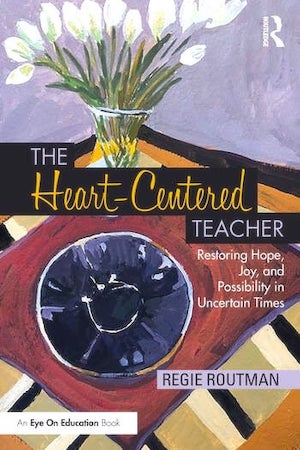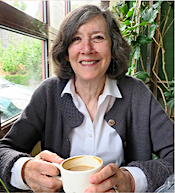Restoring the Joy and Possibility of Teaching
The Heart-Centered Teacher: Restoring Hope, Joy, and Possibility in Uncertain Times
By Regie Routman
(Routledge/Eye on Education, 2023 – Learn more)
Reviewed by Sarah Cooper

The Heart-Centered Teacher: Restoring Hope, Joy, and Possibility in Uncertain Times lives up to its promise of renewal. It strives to be a mosaic of sorts: a combination of sometimes searing, sometimes poignant personal stories with on-the-ground insights from decades of experience.
Routman believes that we are most fully ourselves when “teaching, learning, and living are interwoven and seamlessly integrated.” To show us this full self, she shares stories that might help us navigate our own worlds.
The table of contents illustrates the range and depth of this part memoir, part pedagogical text.
- Chapter 1: Loving Our Students
- Chapter 2: Telling Our Stories
- Chapter 3: Promoting Equitable Opportunities
- Chapter 4: Co-creating a Joyful, Inclusive Culture
- Chapter 5: Developing Professional Knowledge
- Chapter 6: Championing the Reading/Writing Connection
- Chapter 7: Learning to Live with Loss
- Chapter 8: Revitalizing Our Lives Through Friendships
- Chapter 9: Becoming Our Truest Selves
- Chapter 10: Becoming a Significant Influencer
Even in a teaching landscape riddled with challenge and difficulty, Routman urges us to find ways to help the world heal post-pandemic: “While we may feel like some pieces of life are broken, cohering those fragments into a new and promising narrative… is what we strive to do for our students and ourselves.”

Routman also spends a good portion of the middle of the book emphasizing the need for students to read and listen to texts they care about, leading them to become better readers. This stance, from a voice prominent for decades in the literacy community, rings authentic.
Given her decades of experience in inspiring other teachers, when Routman writes, “To be professionally knowledgeable is the hallmark of every conscientious and expert teacher,” I sit up and listen.
At times while reading, you’ll likely want to head down the hall to a colleague’s classroom because she calls on us so clearly to learn from each other. Routman embodies professional generosity, courtesy, and curiosity, impelling us to do the same. In fact, recently while I was trying to decide whether to present at a conference, her honoring of the collaboration between colleagues stayed at the front of my mind.
Gems also appear in the book that teachers can use daily. In fact, I might keep The Heart-Centered Teacher on my desk and open it to a random page if there’s a day I need a little pick-me-up.
Early in the book, Routman suggests we ask about our students or those we love: “What might they be good at?” if we’re not quite sure yet what they are good at. It’s all possibility and promise in her eyes.
Read Regie Routman’s MiddleWeb post:
Seeing and Celebrating Each Learner’s Gifts
Later, in a chapter on becoming our truest selves, she compares cooking to teaching and asserts that both can benefit from simplicity: “Less choice makes me focus and become more creative. It’s the same in the classroom…. Far from ‘anything goes,’ some limitations on wide choice are actually a relief for students and are easier on us as teachers as well.”
In the same chapter she asks us to consider: “What is the most generous thing I can say and do at this time?” I’ve already used this question to redefine situations in my own life.

Similarly, she has gifted us with this book, sharing her warmth, professionalism and love for students and colleagues alike.
Sarah Cooper teaches eighth-grade U.S. History and is Associate Head of School at Flintridge Prep in La Canada, California, where she has also taught English Language Arts. Sarah is the author of Making History Mine (Stenhouse, 2009) and Creating Citizens: Teaching Civics and Current Events in the History Classroom (Routledge, 2017). She presents at conferences and writes for a variety of educational sites. You can find all of Sarah’s writing at sarahjcooper.com.



































